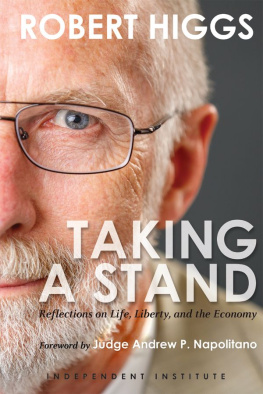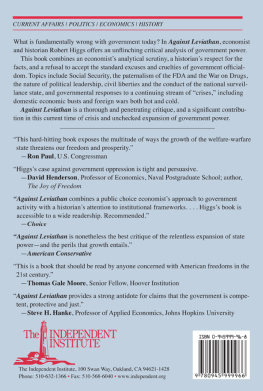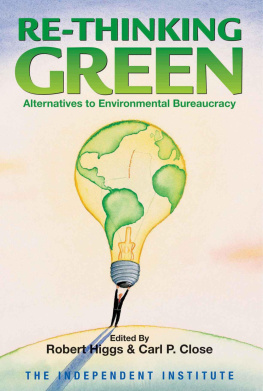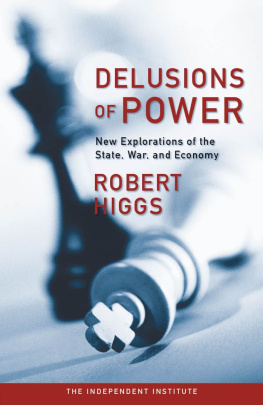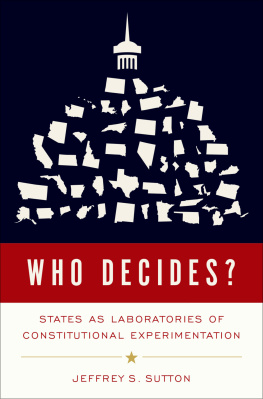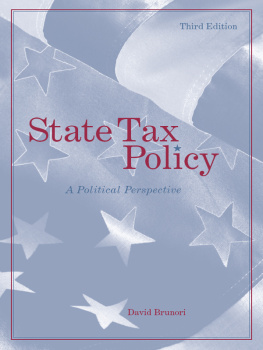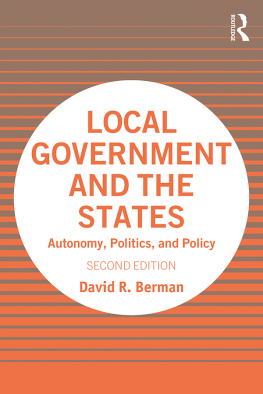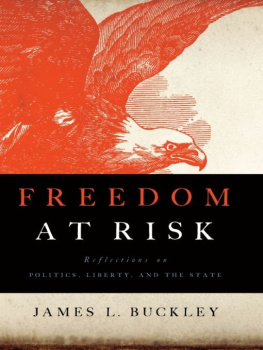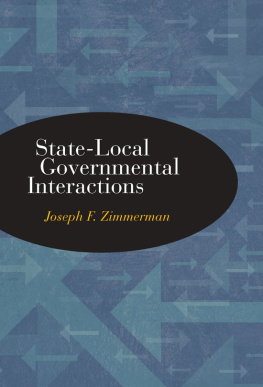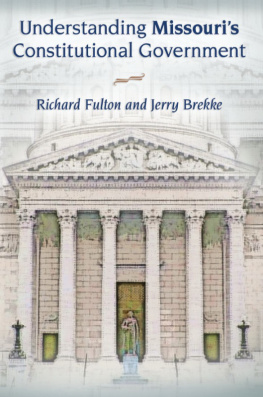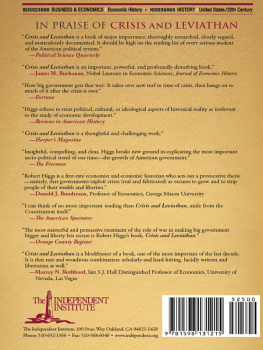TAKING A STAND
Reflections on Life, Liberty, and the Economy
ROBERT HIGGS
Foreword by Judge Andrew P. Napolitano

OAKLAND, CALIFORNIA
Taking a Stand: Reflections on Life, Liberty, and the Economy
Copyright 2015 by the Independent Institute
All Rights Reserved. No part of this book may be reproduced or transmitted in any form by electronic or mechanical means now known or to be invented, including photocopying, recording, or information storage and retrieval systems, without permission in writing from the publisher, except by a reviewer who may quote brief passages in a review. Nothing herein should be construed as necessarily reflecting the views of the Independent Institute or as an attempt to aid or hinder the passage of any bill before Congress.
Independent Institute
100 Swan Way, Oakland, CA 94621-1428
Telephone: 510-632-1366
Fax: 510-568-6040
Email:
Website: www.independent.org
Cover Design: Denise Tsui
Cover Image: Steve Babuljak
Library of Congress Cataloging-in-Publication Data
Higgs, Robert.
Taking a stand : reflections on life, liberty, and the economy / Robert Higgs; foreword by Judge Andrew P. Napolitano.
pages cm
ISBN 978-1-59813-204-5 (paperback); 978-1-59813-203-8 (hardcover) 1. Administrative agenciesUnited StatesHistory. 2. BureaucracyUnited StatesHistory. 3. United StatesEconomic policy. 4. WelfareUnited StatesHistory. 5. LibertyUnited StatesHistory. 6. State, TheHistory. I. Title.
JK411.H543 2015
Foreword
IN THE ANNALS of academic fidelity to the Jeffersonian ideal that government is best which governs least, no one commands and deserves more respect than Dr. Robert Higgs, Senior Fellow in Political Economy at the Independent Institute. Bob's masterpiece, Crisis and Leviathan, remains the standard scholarly critique of the growth of the federal government from the Roosevelt/Wilson to the Carter/Reagan years. In all of the presidencies encompassed by those bookends, including the bookends themselves, the federal government grew radically and well beyond the boundaries envisioned by the Founders.
I know that while many of my conservative brethren will join gleefully in any critical characterization of the Progressive years as those of rampant government interference in private behaviorbehavior not even arguably delegated to the feds by the Constitutionmost will blanch at the juxtaposition of the names Carter and Reagan in the same phrase and to prove the same point.
But not Bob Higgs. Bob is utterly faithful to the simple belief that the Declaration of Independence means what it says: our rights come from our God-given humanity and not from the government; and to the natural-law observation that since men and women in or out of government are not angels, we need a universal rule of lawnot subject to the vagaries of popular whimto restrain their impulses to use the coercive powers of government in controlling how others live and to guarantee that there remain areas of human behavior that are immune from governmental surveillance and regulation.
Prior to the War Between the States, the feds largely stayed out of the private affairs of private persons. From the Reconstruction Era to the Progressive Era, the feds moved in and out of private affairs, started printing money legally, taxed personal income, redistributed wealth, regulated private property, engaged in the least moral, least useful, and most catastrophic of modern American warsWorld War Iand set the stage for the post-Progressive Era which has brought us the Welfare State, the Warfare State, and the Administrative State.
From the Roosevelt/Wilson years up to the present day, every President, notwithstanding his public utterances and the adulation of his supporters, has held the view that the Constitution unleashes the federal government to use the powers of government, which are not reason but force, to address any need the President and congressional leaders want to address, using any means they choose, subject only to the express prohibitions in the Constitution, and subject, of course, to what they can get away with politically.
In his lectures all over the world and in his scholarly writings, no one has chronicled all this with more intellectual credibility and using more cogent reasoning than Bob Higgs. Indeed, to legal and economic scholars and to historians who challenge the modern-day behemoth in Washington, D.C., Bob's work is the standard against which others should be measured, and one to which we all refer on a regular basis.
Of the three lamentable governmental states that progressivism has brought upon us, the least understood is the Administrative State. It is herein the darkness of the perpetual bureaucracy that never changes even when different parties control the White House or Congressthat much mischief to liberty and secret lawmaking is done, all well beneath the radar screen. Why is the pressure in your home shower so weak? Why do office chairsexcept in the White Houseneed to have five legs? Why can't the makers of aspirin describe its uses in advertisements? How can a product be lawful, yet its marketing prohibited? Why can't you catch five lobsters from the oceans for your neighbors use? Surely Congress never debated and legislated on all those things. Surely water pressure and chair legs and lobsters are not areas of regulation delegated by the Constitution to Congress. Well, who did regulate these things, if only Congress can write federal laws? Doesn't the first article of the Constitution begin All legislative Powers herein granted shall be vested in a Congress?
In his academic work, Bob has dissected the government's shrewd secret excesses using its administrative arm; and no one has done so more clearly or more pleasingly. In the pages that follow come similar arguments, but often in a non-academic vein. Be prepared for Bob with his hair let down; for here are essays that show a whimsical, introspective, and personal Bob Higgs. Who would have expected this towering intellect to write about whether the dead can be brought back to life? Who knew that he loves (as I do) Edgar Allen Poe's The Raven and Don MacLean's American Pie and Leonard Cohen's Everybody Knows?
From the myth that the government has derived its powers from the consent of the governed to the role of independent experts in formulating monetary and fiscal policy; from the government's duplicity in announcing the unemployment rate in a given month to how the state entraps us, if you want to see a true polymath at work, a humble giant thinking out loud about whatever thoughts that great mind found worthy of contemplation, these lofty, serious, sad, and illuminating essays will do the unthinkablethey will educate you beyond Crisis and Leviathan.
In my own television and academic work, I have attempted to use Bob's fidelity to first principles as a model. I have not always succeeded. Yet, what a joy it has been for me to see that fidelity from a different angle; one just as faithful and beautiful, yet bound to create additional admiration for a good and fearless man's mind and work that I love so much.

